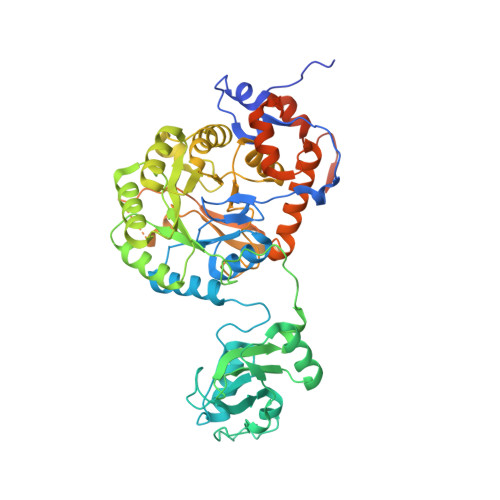Light-sensitive phosphorylation regulates retinal IMPDH1 activity and filament assembly.
Calise, S.J., O'Neill, A.G., Burrell, A.L., Dickinson, M.S., Molfino, J., Clarke, C., Quispe, J., Sokolov, D., Buey, R.M., Kollman, J.M.(2024) J Cell Biol 223
- PubMed: 38323936
- DOI: https://doi.org/10.1083/jcb.202310139
- Primary Citation of Related Structures:
8U7M, 8U7Q, 8U7V, 8U8O, 8U8Y - PubMed Abstract:
Inosine monophosphate dehydrogenase (IMPDH) is the rate-limiting enzyme in guanosine triphosphate (GTP) synthesis and assembles into filaments in cells, which desensitizes the enzyme to feedback inhibition and boosts nucleotide production. The vertebrate retina expresses two splice variants IMPDH1(546) and IMPDH1(595). In bovine retinas, residue S477 is preferentially phosphorylated in the dark, but the effects on IMPDH1 activity and regulation are unclear. Here, we generated phosphomimetic mutants to investigate structural and functional consequences of S477 phosphorylation. The S477D mutation resensitized both variants to GTP inhibition but only blocked assembly of IMPDH1(595) filaments. Cryo-EM structures of both variants showed that S477D specifically blocks assembly of a high-activity assembly interface, still allowing assembly of low-activity IMPDH1(546) filaments. Finally, we discovered that S477D exerts a dominant-negative effect in cells, preventing endogenous IMPDH filament assembly. By modulating the structure and higher-order assembly of IMPDH, S477 phosphorylation acts as a mechanism for downregulating retinal GTP synthesis in the dark when nucleotide turnover is decreased.
- Department of Biochemistry, University of Washington, Seattle, WA, USA.
Organizational Affiliation:



















